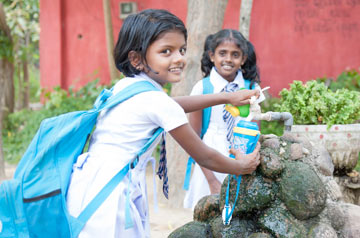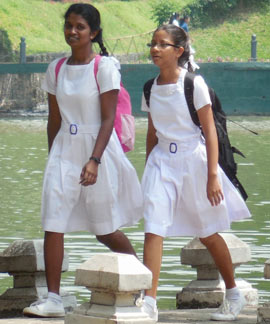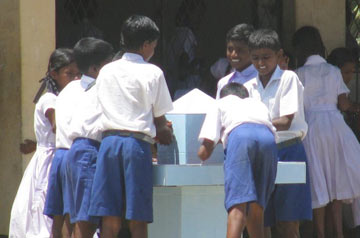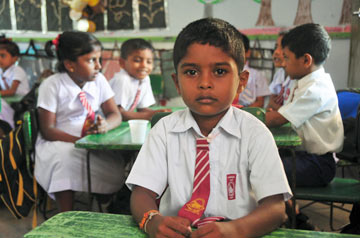|
Sports meets at zonal level postponed:
Overcome by heat
by Husna Inayathullah
The hot weather prevailing in the country could affect children
medical experts warn. In this backdrop, the Education Ministry has
called on schools at zonal level to postpone sports meets which are
usually held from March to May.
  Minister of Education, Akila Viraj Kariyawasam said all zonal level
school sports meets scheduled for this month have been postponed for
May. This comes in the wake of the prevailing weather conditions in the
country. Minister of Education, Akila Viraj Kariyawasam said all zonal level
school sports meets scheduled for this month have been postponed for
May. This comes in the wake of the prevailing weather conditions in the
country.
The Minister said the decision was taken on the advice of the
Meteorology Department and medical experts. The Met Department forecasts
temperatures to reach 38°C this month and medical experts say these
temperatures could be harmful to the health of schoolchildren. "Sports
meets held at zonal level have been postponed till the beginning of May,
while provincial and national level sports meets will be held in July
and September," he added.
Child health
Dr. Surantha Perera, Secretary, Sri Lanka College of Paediatricians (SLCP)
said high temperatures could be harmful to the health of children. He
also spoke about precautions to keep themselves hydrated. As Sri Lanka
is a tropical country, from time to time extreme weather conditions are
experienced. He said not only children but adults too feel uncomfortable
due to the heat. "There is a dip in the performance of schoolchildren.
Children can adapt to temperatures of 32°C or 33°C but not more than
that. There are two types of illnesses caused due to exposure to high
temperature, namely heat exhaustion and heat stroke.
Heat exhaustion is caused by dehydration and the symptoms are
dizziness, fainting, fatigue, headache, muscle cramps, vomitting, pale
skin and rapid heartbeat. A person suffering from heat exhaustion,
should avoid taking too much of fluids as it can aggravate the
situation. They should remove any tight or unnecessary clothing. Take a
cool shower, bathe, or sponge bath. They also can apply other cooling
measures such as switching on fans or using ice towels," he said.
Dr. Perera said heat strokes were less in Sri Lanka compared to heat
exhaustion. Although heat exhaustion was not as serious as heat strokes
it should be taken seriously. Without proper intervention, heat
exhaustion can progress to a heat stroke, which can damage the brain and
other vital organs and even death.
 The main symptom of a heat stroke, is a core body temperature of
above 105 degrees Fahrenheit but fainting may be the first sign. The
patient will feel tired, uncomfortable, vomiting, muscle cramps, rapid
heartbeat and urine output reduces. These people re The main symptom of a heat stroke, is a core body temperature of
above 105 degrees Fahrenheit but fainting may be the first sign. The
patient will feel tired, uncomfortable, vomiting, muscle cramps, rapid
heartbeat and urine output reduces. These people re cover slowly. They
should be kept in a cool environment and should take plenty of fluids. cover slowly. They
should be kept in a cool environment and should take plenty of fluids.
"Skin rashes can also occur due to the heat. It is good to apply
soothing creams. Hot food and heavy meals should be avoided, as they add
heat to your body. Drink plenty of fluids and replace salts and minerals
in your body. Children should drink at least 16-32 ounces of fluids each
hour. Children should be dressed in cool, loose clothing, light colours
and cover their heads and faces with hats or with an umbrella, when
being exposed to sunlight.
It is advisable to limit sun exposure during mid-day and avoid going
to playgrounds. Children should never be left in cars when the engine is
switched off as the temperature can rise," he advised.
Anusha Warnasooriya, Deputy Director to the Forecasting Division,
Department of Meteorology said, "Winds blow from the Bay of Bengal. At
present the Bay of Bengal is a little warmer than on normal days, so the
air is warmer. The temperature increases during daytime as the humidity
is high and wind speed is low. It limits evaporation of water from the
body. During the day, there are no clouds and the sun's radiation comes
directly to the surface. The reason for the present high temperature is
the combined effects of all this. The weather condition in the following
weeks is difficult to predict as changes can occur."
Precautions
B. A. Abeyrathne, Principal, Royal College, Colombo said, " We have
taken precautions. We have cancelled sports practices and hope to
continue when the weather is normal. As heat rays are dangerous, we have
advised children to drink plenty of water and to stay indoors. Children
come to school like on normal days and the numbers have not reduced.
However, due to the heat, they are uncomfortable in the classrooms
although there are fans."
K. Senaratne, Vice Principal, Anuradhapura Mahinda Maha Vidyalaya
said, "We cancelled the sports meet which was scheduled for this month
after we were asked to do so by the Ministry of Education. We have
stopped morning exercises for sometime. We will begin it, after watching
the prevailing situation.
Children usually try to run and play after school but we have advised
them not to do so and to stay under the shade of tress until parents
come to pick them. We have informed parents to come on time, without
delaying to pick children once school is over. We have strictly advised
children to drink plenty of water."
School canteens
Ravilal Wijewansa, Principal Royal College, Polonnaruwa said, "We
have stopped morning exercises and cadet training. Term tests have
begun, Children come to school because of this but they feel
uncomfortable due the excessive heat. They are finding it difficult to
do the examinations well. The school canteen sells more liquids and we
have advised children to drink more water and not to go out during the
mid-day break."
Milhana Razeen, Vice Principal of Naleem Hajiar Ladies College,
Beruwala said, "Student attendance is low these days due to the warm
temperature. Some students go home half day, complaining that they had
headaches and were feeling faintish.
We do not take the children out for physical training. Children find
it even more difficult to work in classrooms as there are no fans. We
advised them to drink more water."
Ahamed Naizar, Primary Sectional Head of Al-Humaizara National
School, Beruwala said the water from the National Water Supply and
Drainage Board was salty and children cannot drink it. We have advised
children to bring more water in bottles and when it is over, they have
to buy drinking water. There are more than 35 students in a classroom
and there is no proper ventilation and no fans. It is a difficult
situation that we are facing." |

